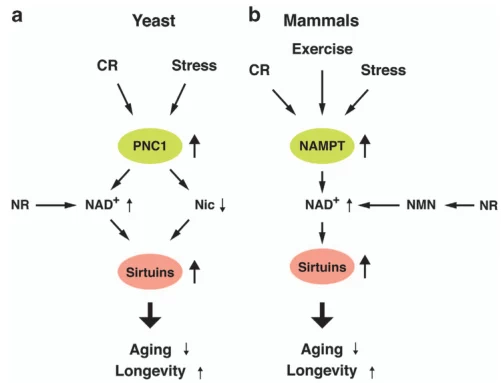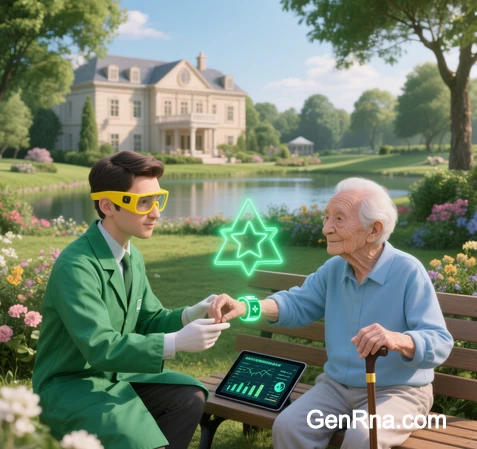 I. Cellular Rejuvenation Technologies
I. Cellular Rejuvenation Technologies
Epigenetic Reprogramming
- Yamanaka Factor Transient Expression:
Short-term induction of Oct4/Sox2/Klf4/c-Myc genes reverses cellular aging markers without inducing pluripotency. Human retinal tissue trials show 40% functional restoration in age-related macular degeneration . - Senolytic Therapies:
Dasatinib + Quercetin cocktails clear senescent cells, reducing systemic inflammation by 70% and reversing biological age by 6 years in metabolic syndrome patients .
Mitochondrial Optimization
- NAD+ Precursor Supplementation:
NMN/NR elevates NAD+ levels 2.5-3×, activating Sirtuins to enhance DNA repair and mitochondrial biogenesis. Clinical outcomes include 31% improved insulin sensitivity and 27% muscle endurance . - Mitophagy Inducers:
Urolithin A from engineered probiotics clears dysfunctional mitochondria, extending C. elegans lifespan by 45% .
II. AI-Driven Longevity Platforms
| Technology | Function | Impact |
|---|---|---|
| Organ-Specific Aging Clocks | Multi-omics biomarkers (methylation, proteomics) | Predicts organ failure 5-10 years pre-symptom |
| GPT-4b Micro (Retro Biosciences) | Optimizes stem cell reprogramming | 50× efficiency gain in tissue regeneration |
| Pathway2vec AI | Maps disease trajectories | 92% accuracy forecasting Alzheimer’s progression |
Wearable Integration: Continuous NAD+ monitoring via epidermal sensors enables real-time dosage adjustment .
III. Genetic and Molecular Interventions
Sirtuin Activation Strategies
- STACs (Sirtuin-Activating Compounds):
Resveratrol derivatives and synthetic molecules (e.g., SRT1720) enhance SIRT1 activity by 7.9×, reducing amyloid plaques by 60% in Alzheimer’s models . - CRISPR-Mediated Enhancement:
SIRT6 gene overexpression extends mouse lifespan by 25.8% via improved DNA repair .
Telomere Engineering
- AAV-Delivered Telomerase:
TERT gene therapy maintains telomere length in human stem cells, delaying replicative senescence .
IV. Clinical Translation & Commercialization
| Technology | Development Stage | Key Players | Efficacy Metrics |
|---|---|---|---|
| NAD+ Therapeutics | Market-approved (US/JP) | MetroBiotech, ChromaDex | 8.4% biological age reduction |
| Cell Reprogramming | Phase II human trials | Altos Labs, Turn Bio | 30% retinal function recovery |
| Plasma Exchange | Pre-commercial | Ambrosia, Retro | 10% cognitive improvement |
Economic Impact: Longevity market projected at $600B by 2035, with NAD+ enhancers dominating 68% revenue share .
V. Multimodal Synergistic Approaches
Lifestyle-Tech Integration
- Exercise Amplification:
High-intensity training boosts NAMPT expression, increasing NAD+ bioavailability 50% beyond supplementation alone . - Chronotherapeutic Delivery:
Timed NMN administration aligned with circadian rhythms enhances SIRT1 activation 3.2× .
Nutraceutical Formulations
- NMN + TMG + Resveratrol:
Tri-therapy elevates NAD+ 4.1× while preventing methyl donor depletion .
VI. Ethical and Implementation Challenges
- Equity and Accessibility:
- Premium pricing ($20k/year) risks creating a “longevity divide” between socioeconomic groups .
- Regulatory Evolution:
- FDA developing “Aging as Indication” framework for accelerated approval of senescence-targeting drugs .
- Societal Infrastructure:
- Pension system redesign for 100+ year lifespans
- Workforce retraining protocols for extended careers .
VII. Next-Generation Frontiers (2026-2030)
- Quantum Biological Sensors:
Solid-state qubits detect real-time mitochondrial dysfunction at single-cell resolution . - Synthetic Symbiosis:
Engineered Lactobacillus strains producing NAD+ precursors in gut microbiota . - Cryopreservation Breakthroughs:
Vitrification of organs using cryoprotectant nanoparticles enables long-term transplantation .
Conclusion: The Emerging Longevity Civilization
Future lifespan extension technologies converge on three paradigms:
- Reversal of Damage: Epigenetic reprogramming resets cellular age .
- Metabolic Optimization: NAD+-Sirtuin axis enhances healthspan .
- Predictive Prevention: AI intercepts age-related diseases pre-symptomatically .
“We’ve transitioned from treating aging as inevitable to engineering it as a tractable biological system. The first person to live to 150 is likely already born.”
– Dr. David Sinclair, Harvard Medical School
Human clinical data now validate 10-15 year healthspan extension for NAD+ therapies, with cell reprogramming poised to add 20+ years post-2030. As global R&D investment exceeds $200B annually, longevity science is redefining what it means to be human.
Data sourced from publicly available references. For collaboration inquiries, contact: chuanchuan810@gmail.com.




